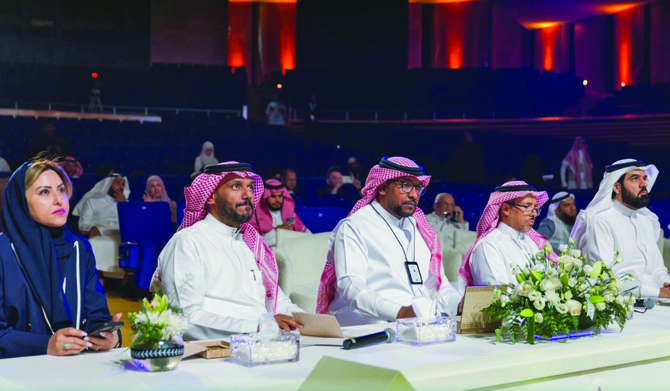JEDDAH: Every year, more than 2 million people visit Saudi Arabia to perform the sacred ritual of Hajj, leading to challenges in transportation, crowd management and communication. In response, Saudi Arabia has leveraged hackathons and adopted innovative technological solutions to tackle these obstacles.
A hackathon is a collaborative event, typically a multi-day challenge, in which programmers, designers and project managers work intensively on software projects.
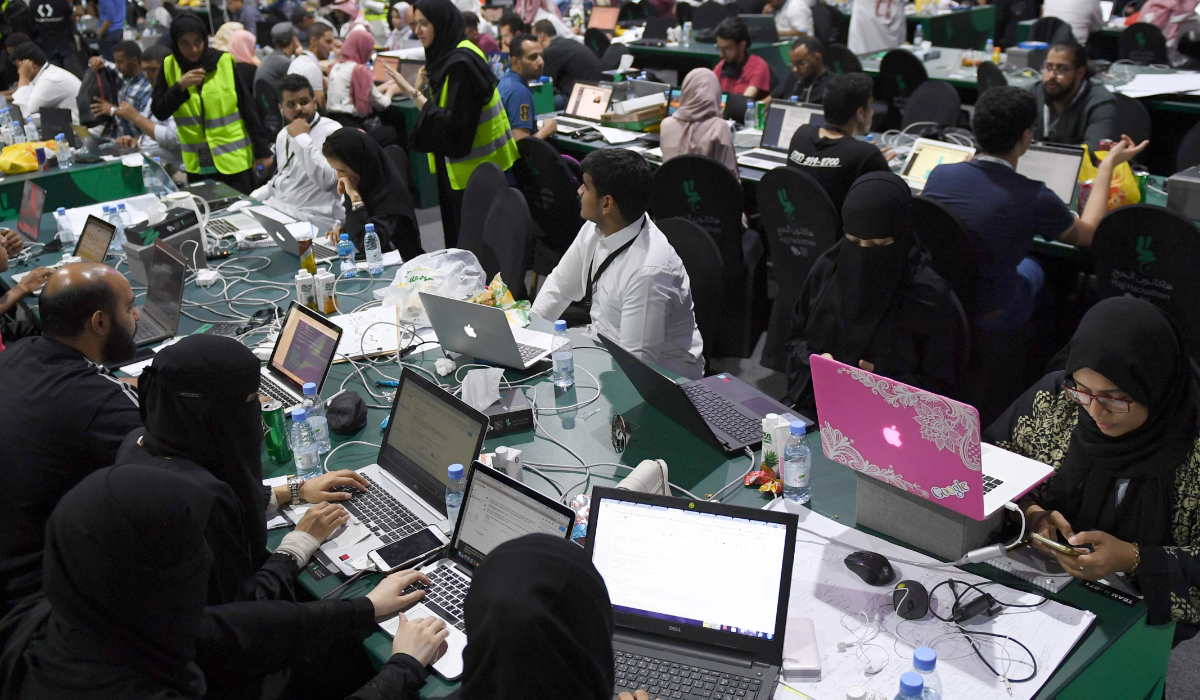
Participants including Saudi women attend a hackathon in Jeddah on August 1, 2018, prior to the start of the annual Hajj pilgrimage in the holy city of Makkah. (AFP file photo)
These events might focus on a variety of topics, such as developing new software, devising inventive solutions to specific difficulties or exploring cutting-edge technologies. Participants form teams to brainstorm ideas, build prototypes and create working software or hardware projects within a set time window.
Hackathons are commonly organized to foster creativity, innovation and teamwork, often leading to the creation of new products, services or tools.
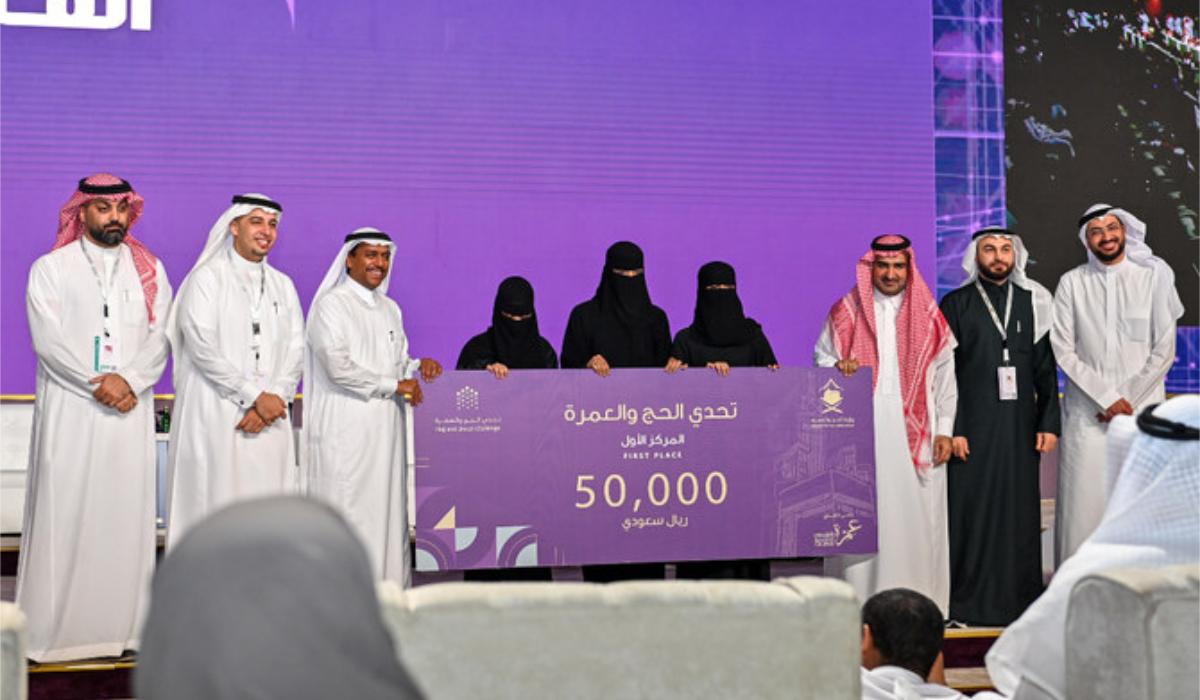
The first-place team of the Hajj and Umrah Challenge won SR50,0000 ($13000) for their creative application titled: Makkah Story in 2023. (Supplied)
In 2018, Jeddah hosted Hajj Hackathon, the largest hackathon in the Middle East with thousands of developers and 18,000 enthusiasts participating. Organized by the Saudi Federation for Cyber Security, Programming and Drones, the event set a Guinness World Record for the largest number of participants.
The first Hajj Hackathon in the region attracted top programmers to innovate technical solutions, improving pilgrims’ experience and fostering profitable projects. It reflects Saudi Arabia’s commitment to innovation, aiming for regional and global tech leadership, supporting young talents and achieving Vision 2030 goals.
FASTFACTS
• The Historic and Enrichment Sites Hackathon in April this year attracted about 700 participants from 15 cities across the Kingdom, with a panel of 12 judges, 16 trainers and 10 guides overseeing the innovative projects.
• The event included 20 training courses, six educational trips, 10 lectures and 12 guidance sessions.
Steve Wozniak, Apple co-founder, was appointed as the Saudi TechHub platform ambassador at the time.
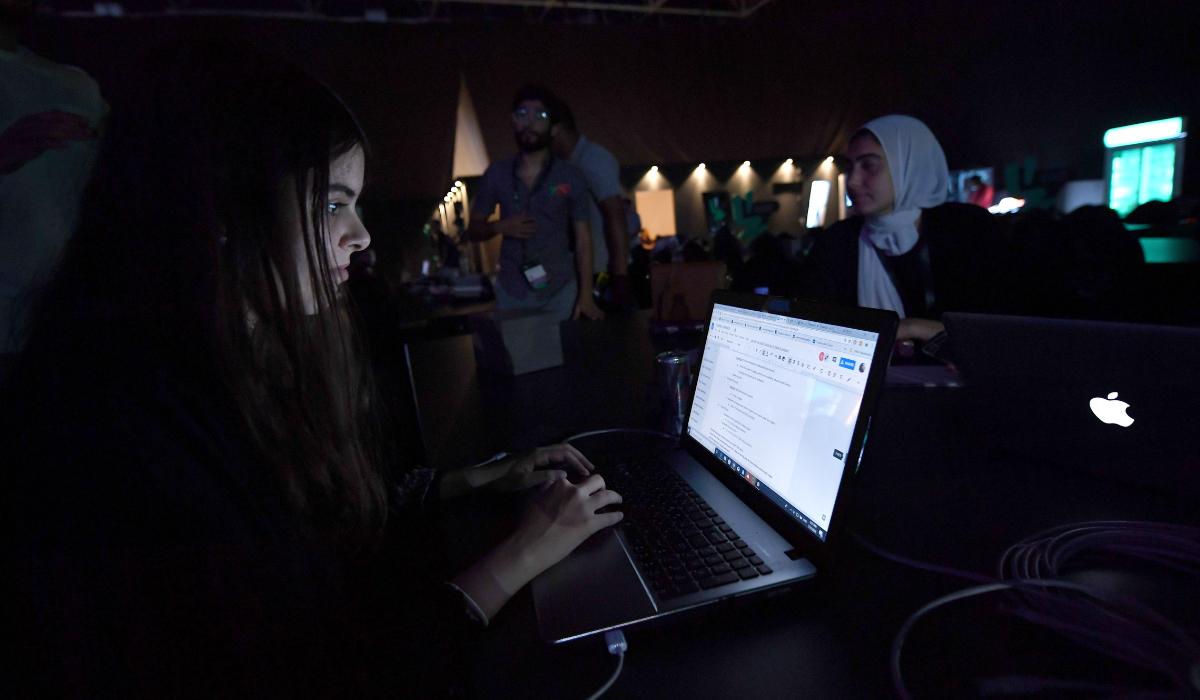
Women attend a hackathon in Jeddah on July 31, 2018, prior to the start of the annual Hajj pilgrimage in the holy city of Makkah. (AFP file photo)
In the first season of the Hajj Hackathon, the Turjuman app achieved first place, winning the coveted SR1 million ($266,000) prize pot. Developed by a group of Saudi women, the app offers translation of signs and guide boards in Makkah and the holy sites without the use of the Internet. The Hajj Wallet app took second place, winning SR500,000, and the Ru’ya app came third, winning SR350,000.
Turjuman assists pilgrims in their own languages, created by five Saudi women united by a common goal: Samaher Al-Hadhli, Raghda Qadhi, Bayan Al-Ghamdi, Rawan Al-Matrafi and Reham Marghalani.
By the next Hajj season in 2019, Turjuman became a helpful tool supporting 10 languages — Indonesian, Malay, Filipino, Hindi, Urdu, Bengali, French, Russian, Turkish and English — and featuring more than 400 signboards distributed across Mina, Muzdalifa, Arafat and the Grand Mosque.
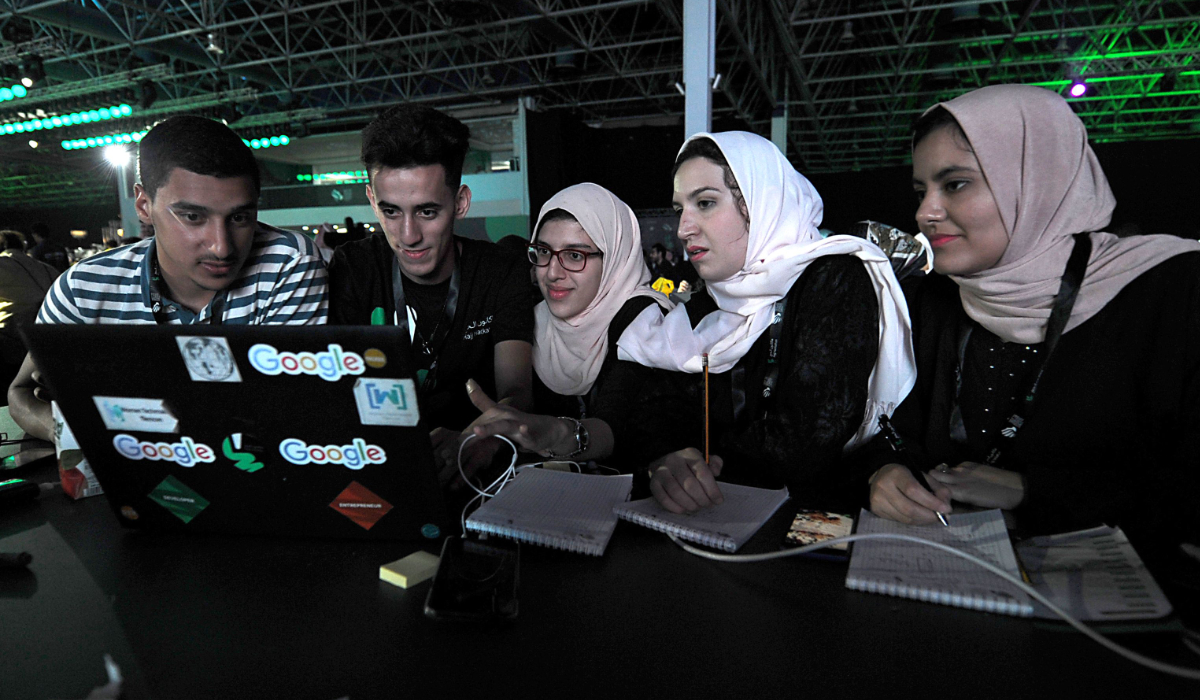
People attend a hackathon in Jeddah on July 31, 2018, prior to the start of the annual Hajj pilgrimage in the holy city of Mecca. (AFP file photo)
During the challenging years of 2020 and 2021, the Kingdom leaned heavily on modern technologies, especially facing the challenge of the global COVID-19 pandemic.
The 2020 Hajj season stood out due to the government’s extensive measures to prioritize pilgrim safety and curb the spread of the virus. Pilgrim numbers were significantly reduced and restricted to individuals within the Kingdom.
The Ministry of Hajj and Umrah introduced the Eatmarna application during this critical period. The application simplified Umrah and visitation procedures over two years, where it issued 43,432,985 Umrah permits. Drawing users from 213 nationalities, it also facilitated 6,363,288 permits for prayer in the Rawdah Sharifah at the Prophet’s Mosque.
In 2022, Eatmarna was replaced by the Nusuk, which eased the process for pilgrims worldwide, simplified electronic visa procedures and enhanced pilgrims’ experiences. Nusuk remains the primary application for these purposes.
The effects of technological innovations on the cultural and spiritual aspects of the Hajj refer to how new technologies developed during these hackathons impact the experience of pilgrims. These innovations can enhance various aspects of the Hajj journey, such as improving safety, providing better access to information and facilitating smoother logistics.
Dania Moayad, an Iraqi pilgrim who performed Hajj in 2021, told Arab News: “Using the Eatmarna application made my pilgrimage journey incredibly smooth and efficient. It provided real-time updates, guidance and essential information that enhanced my overall experience.”
Asia Ahmad, a pilgrim from Sudan who performed Hajj in 2021, said: “Eatmarna revolutionized the way I performed my pilgrimage. It simplified complex procedures, helped me navigate crowded areas, and ensured I didn’t miss any important rituals. Truly a modern marvel for pilgrims.”
As COVID-19 restrictions eased and pilgrims returned to full capacity to perform their rituals by 2022, the Ministry of Hajj and Umrah, in collaboration with the Guests of God Service Program, a part of Saudi Vision 2030, launched the second Hajj Hackathon, rebranded as the “Hajj and Umrah Challenge” initiative. This event attracted 1,500 participants and aimed to gather and implement creative ideas to enhance the pilgrim experience through innovative solutions.
The goal was to enable innovators and entrepreneurs to develop technological solutions to improve services for pilgrims. The challenge gathered 40 participants, both in-person and remotely, across six tracks: crowd management, waste management, housing, catering, health, and transportation.
Submissions were narrowed down to 13 by a jury of ministry and tech experts, then to 10 final ideas, with prizes totaling about SR150,000.
Participants attended introductory meetings and workshops to help solve key challenges. The Ministry of Hajj and Umrah adopted the top five winning entries and turned them into business accelerators for real-world implementation.
The Ma’alam team from the Technical College for Girls in Makkah won first place in the challenge. Their application guided pilgrims to the holy sites, with plans to expand services to guide tourists, citizens and residents to the Kingdom’s prominent landmarks.
The app introduces pilgrims to historical landmarks by gathering information, converting it into text, recording it as audio and mapping it to coordinates. Pilgrims receive voice notifications about landmarks based on their location, with options for language and voice commentators.
The second Hajj and Umrah Challenge was held in 2023 during the Hajj and Umra Expo, with 300 teams from around the world participating. This challenge aimed to develop technical projects to serve pilgrims, bringing together programmers and innovators to create solutions for the challenges facing the Hajj and Umrah systems.
The focus was on providing innovative solutions in six tracks: providing information related to the pilgrimage journey, food and hospitality, services for people with disabilities, waste recycling, baggage transportation, and guiding the lost.
The first stage involved about 800 contestants, with 11 teams qualifying for the final stage, from which five winning teams were selected for their innovative ideas. The Makkah Story application won the first-place prize pot of SR50,0000.
Raghad Al-Shareef, the leader of the team consisting of three participants and a graduate of business administration from Umm Al-Qura University in Makkah, told Arab News: “Makkah Story application focuses on highlighting Makkah’s archaeological landmarks and historical stories, as well as providing tourist guidance for the pilgrim and visitor to offer them an enriching experience.”
“We worked day and night over four days … winning feels indescribably amazing,” she said.
The second-placed team, Mataie, won the SR40,000 prize, while the third-placed team, Ehtiwa, which translates to “contain,” received the SR30,000 award.
The team leader, Jumana Al-Wafi, 22, also from Umm Al-Qura University, told Arab News: “Our idea is about the path of waste accumulation in the holy sites. We came up with the idea of relying on the Haram cameras to support artificial intelligence by detecting waste on the streets or containers by notifying the competent authorities that area A has an 80 percent waste piling, and that action should be taken.”
This year in April, aiming at enriching the cultural and religious experience of pilgrims, Umm Al-Qura University and the Ministry of Hajj and Umrah conducted the Historic and Enrichment Sites Hackathon, a groundbreaking event that attracted about 700 participants from 15 cities across the Kingdom, with a panel of 12 judges, 16 trainers and 10 guides overseeing the innovative projects.
The event, which included 20 training courses, six educational trips, 10 lectures and 12 guidance sessions, showcased cutting-edge solutions to enhance the pilgrimage experience.
The winning projects were announced, with the Guide project clinching the top spot for its innovative approach. The “Development of Al-Dira Mosque” project secured second place, while Maalim claimed third in the design and creative thinking category.
In the enrichment, marketing and awareness track, Jawlaty emerged as the winner, followed by Trahalkom in second place and Wasl in third.
In the digitization of the historical heritage category, Ma’alem took the lead, with Nafezat Al-Haramain and DMaps securing second and third place respectively.
The Ministry of Hajj and Umrah emphasized the importance of the challenge in developing the Kingdom’s youth’s digital capabilities by employing their capabilities and relying on their promising talents.


